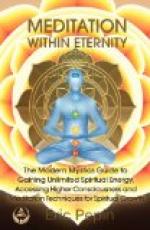“Look how the fine and valuable gold-dust shifts through the screen, leaving only the useless stones and debris in the catches; even so that which is infinitely fine substance becomes lost when sifted through the screen of the limited mind of man,” said a wise Japanese high priest.
However, it is our contention that Buddhism, far indeed from postulating the assumption that individual consciousness is swallowed up in The Absolute, as is frequently understood by Occidental translators of Buddhistic writings, announces a calm and unquestioning conviction in the power of man to attain to immortality, and consequent godhood, through contemplation of faith in his own identity with the Supreme One.
When we consider that there are in the religion of Buddhism, as many as sixty different expositions of the teachings of the Lord Buddha, and that these vary, even as the Christian sects vary in their interpretations and presentments of the instructions of the Master, Jesus of Nazareth, we begin to have some idea of the difficulties of correct interpretation of the obscure and mystical language in which mukti is ever described.
One of the most quoted of the translations of the Life of Buddha, reaches the English readers through devious ways, namely, from the Sanskrit into Chinese, and from the Chinese into English, and again edited by an English scientist who is also an Oriental scholar.
We must also consider the poverty of the English language when used to describe supra-conscious experiences, or what modern thought terms Metaphysics. Only within very recent times, approximating twenty-five years, there have been coined innumerable words in the English language.
The advances made in mechanical, scientific, ethical and philosophical thought, have made this a necessity, while, when it comes to an attempt at clarifying the meaning of mystical terms, a very wide range of interpretation is imperative.
Buddha, addressing his servant, says:
“Kandaka, take this gem and going back to where my father is, lay it reverently before him, to signify my heart’s relation to him.”
It is related that the gem mentioned was a beryl, which in the language of gems signifies purity and peace. It must be remembered that all Oriental languages give power to gems, perfumes and talismanic symbols. This fact makes direct translation of Oriental writings a difficult task for the Occidental scholar, who, until recently at least, gave no power to so-called “inanimate” things.
“And then for me request the king to stifle every fickle feeling of affection, and say that I, to escape from birth and age and death, have entered the forest of painful discipline.
“Not that I may get a heavenly birth, much less because I have no tenderness of heart, or that I cherish any cause of bitterness, but Only that I may escape this weight of sorrow; the accumulated long-night weight of covetous desire. I now desire to ease the load, so that it may be overthrown forever; therefore I seek the way of ultimate escape.




